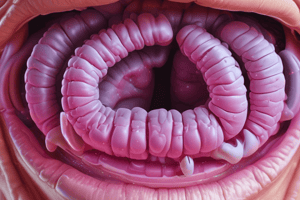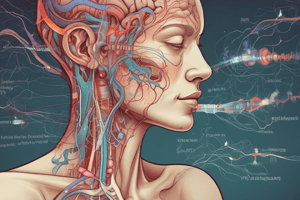Podcast
Questions and Answers
What is one of the primary causes of sleep apnea?
What is one of the primary causes of sleep apnea?
- Regular exercise
- Balanced sleep schedule
- Healthy diet
- Excess weight (correct)
Which symptom is commonly associated with sleep apnea?
Which symptom is commonly associated with sleep apnea?
- Heightened energy levels
- Improved concentration
- Loud snoring (correct)
- Excessive exercise
Which treatment option is specifically used for managing sleep apnea?
Which treatment option is specifically used for managing sleep apnea?
- Continuous positive airway pressure (CPAP) (correct)
- Acupuncture
- Heat therapy
- Physical therapy
What is one of the potential complications of untreated sleep apnea?
What is one of the potential complications of untreated sleep apnea?
How can one potentially reduce the risk of sleep apnea?
How can one potentially reduce the risk of sleep apnea?
What is the Greek origin of the word 'apnea'?
What is the Greek origin of the word 'apnea'?
Which of the following is NOT a symptom of sleep apnea?
Which of the following is NOT a symptom of sleep apnea?
What is a recommended lifestyle change to help manage sleep apnea?
What is a recommended lifestyle change to help manage sleep apnea?
What part of the population is particularly affected by sleep apnea?
What part of the population is particularly affected by sleep apnea?
Which type of sleep apnea is caused by an obstruction of the airway?
Which type of sleep apnea is caused by an obstruction of the airway?
Excess weight is a cause of sleep apnea.
Excess weight is a cause of sleep apnea.
Sleep apnea only affects women.
Sleep apnea only affects women.
A common treatment for sleep apnea is lifestyle changes such as losing weight.
A common treatment for sleep apnea is lifestyle changes such as losing weight.
Morning headache is a symptom of sleep apnea.
Morning headache is a symptom of sleep apnea.
Sleep apnea is a condition that causes excessive daytime sleepiness.
Sleep apnea is a condition that causes excessive daytime sleepiness.
Sedatives can help prevent sleep apnea episodes.
Sedatives can help prevent sleep apnea episodes.
Sleep apnea is a lifelong condition for everyone.
Sleep apnea is a lifelong condition for everyone.
People with sleep apnea may stop breathing during their sleep.
People with sleep apnea may stop breathing during their sleep.
Symptoms of sleep apnea include loud snoring and irritability.
Symptoms of sleep apnea include loud snoring and irritability.
The Greek word 'apnea' translates to 'sudden sleep'.
The Greek word 'apnea' translates to 'sudden sleep'.
Flashcards
Sleep Apnea
Sleep Apnea
A condition where breathing repeatedly stops and starts during sleep.
What causes sleep apnea?
What causes sleep apnea?
Excess weight, smoking, a big neck circumference, being male, being older, family history, nasal congestion, alcohol use, and sedatives can all cause sleep apnea.
Obstructive Sleep Apnea
Obstructive Sleep Apnea
The most common type of sleep apnea, caused by a blockage in the airway.
Central Sleep Apnea
Central Sleep Apnea
Signup and view all the flashcards
Symptoms of Sleep Apnea
Symptoms of Sleep Apnea
Signup and view all the flashcards
Treatment for Sleep Apnea
Treatment for Sleep Apnea
Signup and view all the flashcards
CPAP Machine
CPAP Machine
Signup and view all the flashcards
Prognosis of Sleep Apnea
Prognosis of Sleep Apnea
Signup and view all the flashcards
Hypersomnia
Hypersomnia
Signup and view all the flashcards
Nasal Congestion
Nasal Congestion
Signup and view all the flashcards
What is sleep apnea?
What is sleep apnea?
Signup and view all the flashcards
What are some symptoms of sleep apnea?
What are some symptoms of sleep apnea?
Signup and view all the flashcards
What are some causes of sleep apnea?
What are some causes of sleep apnea?
Signup and view all the flashcards
What are some lifestyle changes for sleep apnea?
What are some lifestyle changes for sleep apnea?
Signup and view all the flashcards
What are some potential disabilities caused by sleep apnea?
What are some potential disabilities caused by sleep apnea?
Signup and view all the flashcards
Study Notes
Sleep Apnea
- Sleep apnea is a condition causing breathing to stop during sleep
- The word "apnea" comes from the Greek word for "breathless"
- Episodes occur due to airway blockage (obstructive) or brain's inability to control breathing (central)
- Obstructive sleep apnea is common, affecting about 39 million US adults
- Snoring is a common symptom, affecting up to 94% of patients with sleep apnea
- Untreated sleep apnea can cause heart, kidney, and metabolic problems
- Approximately 80% of sleep apnea cases are undiagnosed
- Breathing disruptions can occur hundreds of times nightly during sleep
- Being overweight is not the only risk factor for sleep apnea
- Genetics may contribute to sleep apnea
- Dentists can treat sleep apnea with oral appliances
- Sleep apnea increases the risk of type 2 diabetes and insulin issues
Causes of Sleep Apnea
- Excess weight
- Smoking
- Large neck circumference
- Narrowed airway
- Male gender
- Older age
- Family history
- Nasal congestion
- Use of alcohol or sedatives / tranquilizers
Symptoms of Sleep Apnea
- Loud snoring
- Awakening with a dry mouth
- Morning headaches
- Irritability
- Difficulty concentrating
- Difficulty sleeping
- Gasping for air during sleep
- Excessive daytime sleepiness (hypersomnia)
Prognosis of Sleep Apnea
- Prognosis is often good with treatment
- Treatment may resolve the condition in some individuals
- In others, it may be a lifelong condition
Treatments for Sleep Apnea
- Continuous positive airway pressure (CPAP) is a common treatment
- Lifestyle changes, such as weight loss and smoking cessation, are often recommended for milder cases
- Other treatments may be necessary for others.
Support Groups
- Sleep Apnea Community | Lung Saskatchewan
- Patient Support Group - SLEEP ON IT! - Public Health Campaign on Sleep
- Sleep Apnea | SaskHealthAuthority
Studying That Suits You
Use AI to generate personalized quizzes and flashcards to suit your learning preferences.




